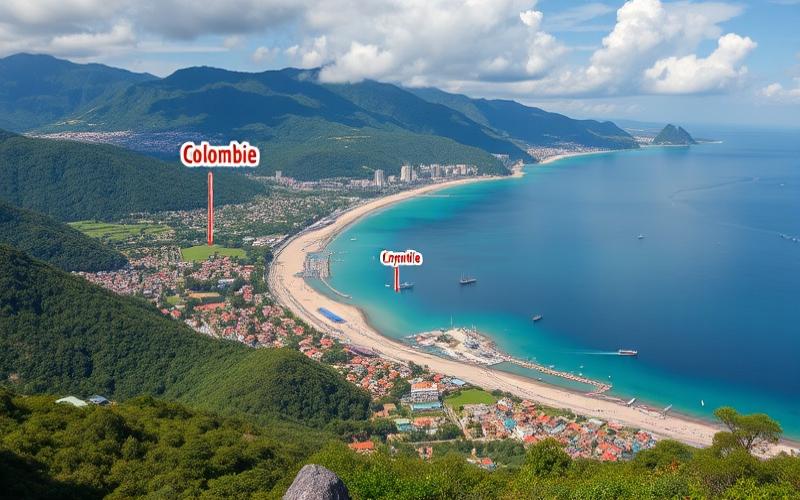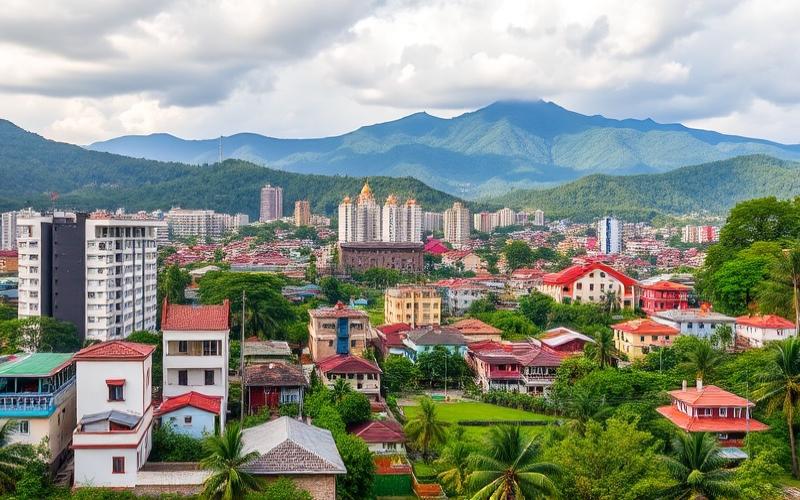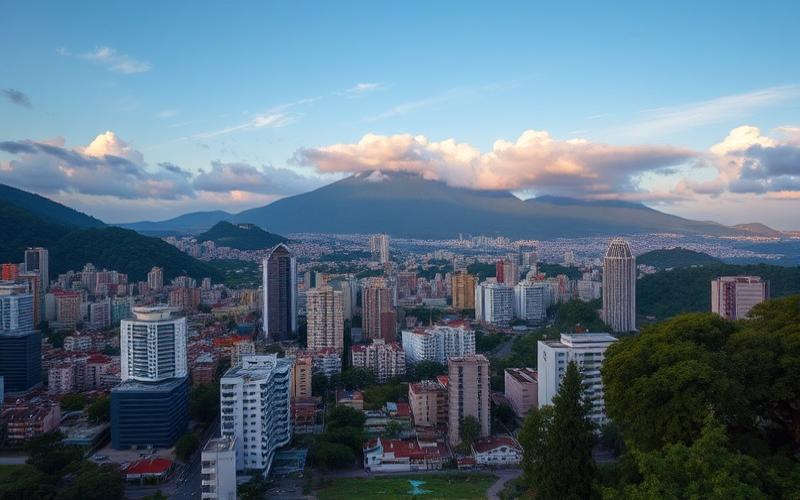
 Published on and written by Cyril Jarnias
Published on and written by Cyril Jarnias
Relocating to a new country with the ambition to start a business is an adventure filled with challenges and opportunities. Colombia, with its dynamic economy and growing markets, provides an attractive backdrop for expat entrepreneurs looking to launch their ventures.
Whether in Bogota, Medellin, or Cartagena, understanding the cultural and administrative specifics of this vibrant country is essential for success. This guide will walk you through step by step, from business idea research to specific legal procedures, including essential networking strategies.
Discover how to turn your entrepreneurial dreams into reality while navigating the nuances of a captivating and promising foreign environment.
Choosing the Right Legal Structure in Colombia
Main legal structures for doing business in Colombia:
| Legal Structure | Number of Partners | Liability | Minimum Share Capital | Governance | Taxation | Administrative Procedures |
|---|---|---|---|---|---|---|
| SAS (Simplified Stock Corporation) | 1 or more | Limited to contribution | No legal minimum | Flexible, board of directors optional | Corporate tax, under general regime | Highly simplified, private document |
| LTDA (Limited Liability Company) | 2 to 25 | Limited to contribution | No legal minimum | Mandatory management | Corporate tax, general regime | Bylaws by private deed, moderate |
| SA (Public Limited Company) | 5 or more | Limited to contribution | 50% of authorized capital, 1/3 paid at creation | Mandatory board of directors | Corporate tax, general regime | Notarized deed required, more complex |
| Branch of Foreign Company | N/A (subsidiary) | Parent company liability | No legal minimum | No separate bodies | Corporate tax, general regime | Special procedure, more burdensome |
| Limited Partnership | 2 or more (general/limited partners) | General partners: unlimited; Limited partners: limited to contribution | No legal minimum | Mandatory management | Corporate tax, general regime | Uncommon, similar process to LTDA |
Key Features of Structures:
SAS (Simplified Stock Corporation)
- Most popular structure for entrepreneurs, including foreigners
- Creation by one or more partners (individuals or entities)
- Liability limited to contribution
- High flexibility in drafting bylaws and management
- Board of directors optional
- Freely set share capital; no legal minimum
- Taxation on profits at corporate tax rate
- Quick and low-cost procedures, often achievable in days via private document
LTDA (Limited Liability Company)
- Suitable for SMEs and family businesses
- Between 2 and 25 partners
- Liability limited to contribution
- Mandatory management (manager appointed by partners)
- Free share capital, divided into equal shares
- Share transfers requiring partner approval
- Moderate administrative procedures, bylaws by private deed
SA (Public Limited Company)
- Recommended for large companies or those planning to have many shareholders
- Minimum 5 shareholders, none can hold over 95% of capital
- Liability limited to contribution, except in case of fraud
- Mandatory board of directors (at least 3 members)
- Share capital: at least 50% of authorized capital must be subscribed at creation, 1/3 paid immediately, remainder within one year
- Mandatory auditor status
- Incorporation by notarized deed, more burdensome procedures
Branch of Foreign Company
- Allows a foreign company to operate directly in Colombia
- No separate legal entity, dependent on parent company
- Requires specific registration procedure
- Taxation identical to local companies
Limited Partnership
- Hybrid structure, uncommon
- Two types of partners: general partners (unlimited liability) and limited partners (liability limited to contribution)
- Used for specific projects or partnerships
Advantages and Disadvantages by Structure:
| Structure | Advantages | Disadvantages |
|---|---|---|
| SAS | High flexibility, single partner possible, administrative simplicity, limited liability, free capital | May require auditor beyond certain thresholds, less suitable for listed companies |
| LTDA | Suitable for SMEs/families, limited liability, free capital | Limit on number of partners, restricted share transfer, less flexible than SAS |
| SA | Suitable for large companies, ability to raise funds from many investors | Complex incorporation, heavy governance, minimum capital to pay, increased obligations (auditor, board of directors) |
| Branch | Allows operation without creating new entity, continuity with parent company | Unlimited liability of parent company, complex registration procedures |
| Limited Partnership | Structure suitable for mixed projects, clear role separation | Unlimited liability of general partners, rare in practice |
Key Steps for Business Registration in Colombia:
- Choose the appropriate legal structure
- Check and reserve the company name with the Chamber of Commerce
- Draft and legalize bylaws (by private deed or notarized depending on structure)
- Register the company with the Chamber of Commerce (Matrícula Mercantil)
- Obtain a tax identification number (NIT) from DIAN
- Register with social and tax registries according to activity (e.g., social security, exporter registry)
- Open a professional bank account
- Renew registration annually
Tips for Choosing the Right Structure:
Type of business and sector: Start-ups, subsidiaries, technology companies, or individual businesses prefer SAS for its flexibility. Family projects or traditional SMEs often choose LTDA. Large groups and listed companies use SA.
Number of partners: For a single person, SAS is the only option. For a small restricted group, LTDA is suitable. For projects requiring participation of many investors, SA is essential.
Development objectives: If you plan to welcome investors or go public, SA is necessary. For flexible management and family control, LTDA or SAS are more appropriate.
Level of formalities and control: The more complex the structure (SA, Branch), the higher the governance, audit, and transparency obligations.
Recent Legislative Reforms and Updates:
- Reforms on economic thresholds for audit obligation (statutory audit): thresholds periodically reevaluated
- Maintenance of SAS as preferred structure, no recent major reforms challenging its attractiveness
- Progressive digitalization of procedures with chambers of commerce
Concrete Examples:
A French entrepreneur launching a tech startup in Colombia opted for SAS: he was able to create his company alone, freely adjust his capital, and manage the business without a mandatory board of directors.
A family-owned coffee exporting SME chose LTDA to limit entry of new partners and maintain family control, while limiting liability.
An American multinational opened a branch to operate directly, without creating a local subsidiary.
Key takeaway: SAS stands out as the most suitable structure for most entrepreneurs and expats due to its simplicity, flexibility, and personal asset protection. However, each situation should be evaluated based on the project’s nature, partner profiles, and growth ambitions.
Good to know:
The Simplified Stock Corporation (SAS) is particularly favored for its flexibility and simplified administrative procedures in Colombia; however, for businesses requiring broader capital opening, the Public Limited Company (SA) may be more appropriate, although it imposes stricter requirements regarding share capital.
Administrative Procedures to Launch Your Business
Administrative Procedures to Launch a Business in Colombia (Expats)
Main Steps to Follow:
1. Obtaining Visa and Residence Permit for Entrepreneurs
To create a business and obtain an entrepreneur visa (Migrant M visa), you generally need to justify share capital exceeding 100 monthly legal minimum wages (amount varies by year).
Share capital can include tangible assets (vehicles, equipment, etc.).
The visa is personal: for a couple, you need to double the capital and distribute shares 50% each.
The manager and legal representative must reside in Colombia and have an adequate visa.
After obtaining the visa, apply for the cédula de extranjería (foreigner ID card).
Typical timeframe for visa: 1 to 3 months.
2. Choosing the Legal Structure
| Legal Form | Main Characteristics | Minimum Share Capital | Specifics for Expats |
|---|---|---|---|
| SAS | Simplified Stock Corporation, flexible, single-member possible, limited liability | No legal minimum, but required for entrepreneur visa | Most suitable and popular structure |
| SRL | Limited Liability Company, more restrictive management | Variable, generally low | Less flexible, heavier management requirements |
| SA | Public Limited Company, suitable for large projects | Higher, depending on sector | Rarely used by SMEs/expats |
3. Business Registration
Check commercial name availability with the trade registry.
Prepare bylaws, identities and addresses of shareholders/administrators.
Submit file to local Cámara de Comercio (chamber of commerce).
Registration timeframe: 1 to 2 weeks after file submission.
4. Opening a Professional Bank Account
Mandatory and conditional on presenting bylaws and registration documents.
5. Obtaining RUT (Single Tax Registry) and NIT
Register with DIAN (tax administration) to obtain RUT (mandatory for any tax obligation).
The NIT (Tax Identification Number) is assigned to the company for invoicing and tax payments.
Timeframe: generally 1 to 2 weeks after company registration.
6. Social Security Registration
Register the company and employees with Colombian social security (health, retirement, professional risks).
7. Obtaining Specific Licenses and Permits
Depending on activity (restaurants, construction, healthcare, etc.), additional licenses may be required.
List of Documents to Prepare
- Company bylaws
- Passports and proof of address for shareholders and administrators
- Proof of share capital deposit
- Signed creation resolution
Tax Obligations and Certifications
- Regular declarations (VAT, corporate tax, etc.)
- Maintaining accounting compliant with local standards
- Compliance with electronic invoicing obligations
Typical Administrative Timeframes
| Step | Estimated Timeframe |
|---|---|
| Document preparation | 1 to 2 weeks |
| Company registration (Chamber) | 1 to 2 weeks |
| Obtaining NIT/RUT (DIAN) | 1 to 2 weeks |
| Visa and cédula de extranjería | 1 to 3 months |
Colombian Specifics Compared to Other Countries
- SAS flexibility: very flexible structure, possibility of single shareholder, liability limited to share capital.
- No legal minimum share capital for SAS, except for entrepreneur visa.
- Quick registration: business creation is often faster than in France or Europe.
- Taxation and social obligations: importance of complying with declarations and managing social obligations, under penalty of immediate sanctions.
- Highly digitized process: many procedures are done online, but assistance from a local lawyer or expert is recommended.
Local Support Resources and Services
- Local chambers of commerce (Cámara de Comercio)
- Law firms specialized in business law
- Local tax advisors (experts in Colombian taxation)
- Expat associations and French-speaking networks (UFE, entrepreneur associations)
Good to know:
In Colombia, choosing a legal structure like SAS is often recommended for its flexibility, while obtaining an M-type visa is essential for entrepreneurs wishing to reside in the country. Ensure to register the business with the local chamber of commerce and obtain the RUT to comply with tax obligations, with a minimum share capital generally required of 1000 USD.
Administrative procedures in Colombia are generally faster and more flexible than in Europe, but it’s crucial to anticipate tax and social obligations, choose the right structure (SAS), and get assistance from a local professional to secure each step.
Understanding Tax Considerations as an Expat
Specific Tax Regulations for Expats in Colombia
- Anyone residing more than 183 days in 365 is considered a tax resident.
- Non-residents are taxed only on Colombian-source income.
- Tax residents must declare all worldwide income and assets, including those held abroad.
- Expats must obtain a NIT (Tax Identification Number) for all tax procedures.
Tax Implications Related to Business Creation in Colombia
- Business creation subject to corporate tax and 16% VAT (IVA).
- Expat entrepreneur tax resident must declare worldwide generated income, including from the business in Colombia and abroad.
- Invoicing obligations, social contributions, and annual declaration via DIAN portal.
- Industry and commerce tax applies locally to companies.
Annual Declarative Obligations for Expat Entrepreneurs
- Annual declaration of income and assets (online via DIAN).
- If tax resident, obligation to declare worldwide income and fill informative declaration of assets held abroad if annual threshold is exceeded.
- Keeping proof of income, invoices, and bank documents.
- Payment of due taxes by declaration date, under penalty of fines and interest.
Points to Monitor to Avoid Double Taxation
- Check existence of a bilateral tax treaty between Colombia and home country.
- Use of tax credits for taxes already paid abroad.
- Transparent declaration of income and assets in both countries.
- Respect specific thresholds and obligations of treaties to avoid double taxation.
Differences Between Tax Resident and Non-Resident
| Tax Status | Definition | Taxable Income | Tax Rate |
|---|---|---|---|
| Tax Resident | >183 days/year in Colombia | Worldwide income | Progressive up to 39% |
| Non-Resident | ≤183 days/year | Colombian income only | Flat: 20 to 35% |
Impact of Tax Treaties and Bilateral Agreements
- Some countries have treaties to avoid double taxation, allowing deduction of taxes paid abroad.
- These agreements specify declarative obligations and tax credit modalities.
- Treaties can limit double taxation on dividends, interest, royalties, and activity income.
Practical Tips for Effective Tax Management
- Keep all proof of income and expenses.
- Check declaration thresholds annually on official DIAN website.
- Consult a local accountant or tax specialist in international taxation to optimize your situation.
- Stay informed about legislative changes and applicable bilateral treaties.
- Use online portals to declare and pay taxes to avoid delays and penalties.
Remember: To avoid errors and sanctions, it’s highly recommended to seek assistance from a local professional mastering Colombian and international taxation.
Good to know:
It’s crucial to understand the distinctions between being a tax resident or not in Colombia, as this directly influences your tax rates, and to consult a local tax expert to avoid double taxation through bilateral agreements. To avoid any complications with annual declarative obligations, familiarize yourself with specific tax regulations for expats and benefit from advantages offered by tax treaties between Colombia and your home country.
Accessing Funding and Support Resources in Colombia
Available funding sources for entrepreneurs in Colombia:
- Local banks: offer commercial loans and investment programs for SMEs, each institution with its own criteria and products.
- Private investors: Business Angel networks (e.g., Bavaria Foundation), venture capital, and institutional investors targeting high-potential startups.
- Government grants: programs like Destapa Futuro, Ventures, Fondo Emprender, Innovadores de América, Convocatoria Innpulsa, offering funding and innovation support.
- Crowdfunding: online platforms allowing fund raising for innovative projects.
Comparative Table of Main Funding Sources
| Source | Typical Amount | Main Criteria | Obtainment Timeframe |
|---|---|---|---|
| Local banks | Variable | Solvency, solid business plan | 1-3 months |
| Business Angels | 25,000 to 250,000 USD | Growth potential, team | Quick (few weeks) |
| Government grants | Variable (often 10k-100k USD) | Innovation, sector impact, regulatory compliance | 2-6 months |
| Crowdfunding | According to set goal | Attractive project, effective campaign | Variable |
Eligibility Criteria and Typical Application Processes:
- Presentation of detailed business plan and financial projections.
- Proof of commercial viability and project innovation.
- Legal documents: company registration, tax identification, professional bank account opening.
- For grants and calls for projects, compliance with program objectives, targeted sector and sometimes social or environmental impact.
- Application process: online submission or to institutions, interviews or pitch before jury, sometimes assistance with file preparation.
Resources and Local Organizations for Expat Entrepreneurs:
- Business France Colombia: partner identification and local market support.
- France Colombia Chamber of Commerce and Industry: implantation support and networking.
- La French Tech Bogotá: support for French tech startups.
- ProColombia: personalized support for foreign investors, workshops, training and mentoring.
- Sector clusters: AgTech, Fintech, logistics, facilitating collaboration and innovation.
Colombian Business Incubators and Accelerators:
- Ruta N (Medellín): specialization in technologies, urban innovation, health, energy, access reserved for innovative and scalable projects.
- Créame: focus on SMEs, access by file selection and pitch.
- Innpulsa Colombia: support for high-potential startups, admission conditions based on innovation and economic impact.
- Rockstart: focus on technology, sustainability, international selection and intensive mentoring.
| Incubator/Accelerator | Specialization Area(s) | Admission Conditions |
|---|---|---|
| Ruta N | Tech, urban innovation, health | File + pitch, innovation |
| Créame | SMEs, multi-sector | File, commercial viability |
| Innpulsa | Startups, economic impact | Innovation, growth potential |
| Rockstart | Tech, sustainability | International selection |
- Open a professional bank account as soon as the business is created to separate personal and professional finances.
- Consider cultural differences: importance of network, valuing human relationships in negotiations.
- Familiarize yourself with local regulations: tax requirements, social obligations, administrative documentation.
- Prepare all documents in Spanish, and rely on local partners or advisors to facilitate procedures.
- Stay informed about regulatory stability and market developments to anticipate risks.
Expat Entrepreneur Testimonials:
“ProColombia’s support was decisive in understanding the market and structuring our funding file. The main challenge remains mastering local administrative procedures, but the ecosystem is very open to foreign initiatives.”
“Obtaining a grant via Innpulsa requires rigorous preparation, but personalized support and mentoring are real assets to accelerate our project’s development.”
Current Colombian Market Trends Influencing Funding and Resources:
- Sustained GDP growth, macroeconomic stability and openness to foreign investment.
- Priority given to innovative sectors: clean energy, technologies, sustainable agriculture, digital transformation.
- Multiplication of sector clusters and public-private partnerships to support entrepreneurship.
- Increase in national and international calls for projects, facilitating funding access for startups and SMEs.
Key Takeaway:
The Colombian entrepreneurial landscape offers numerous funding and support opportunities, but requires adaptation to local practices and meticulous file preparation.
Good to know:
In Colombia, expat entrepreneurs can access funding through local banks, private investors and government grants, with eligibility criteria varying by source; organizations like INNPulsa also offer workshops and mentoring, while specialized incubators such as Ruta N facilitate technological innovation. Note that considering cultural differences is crucial when navigating the financial system, and several expat successes show that adaptive attitudes and strong local networks are valuable assets.
Disclaimer: The information provided on this website is for informational purposes only and does not constitute financial, legal, or professional advice. We encourage you to consult qualified experts before making any investment, real estate, or expatriation decisions. Although we strive to maintain up-to-date and accurate information, we do not guarantee the completeness, accuracy, or timeliness of the proposed content. As investment and expatriation involve risks, we disclaim any liability for potential losses or damages arising from the use of this site. Your use of this site confirms your acceptance of these terms and your understanding of the associated risks.























